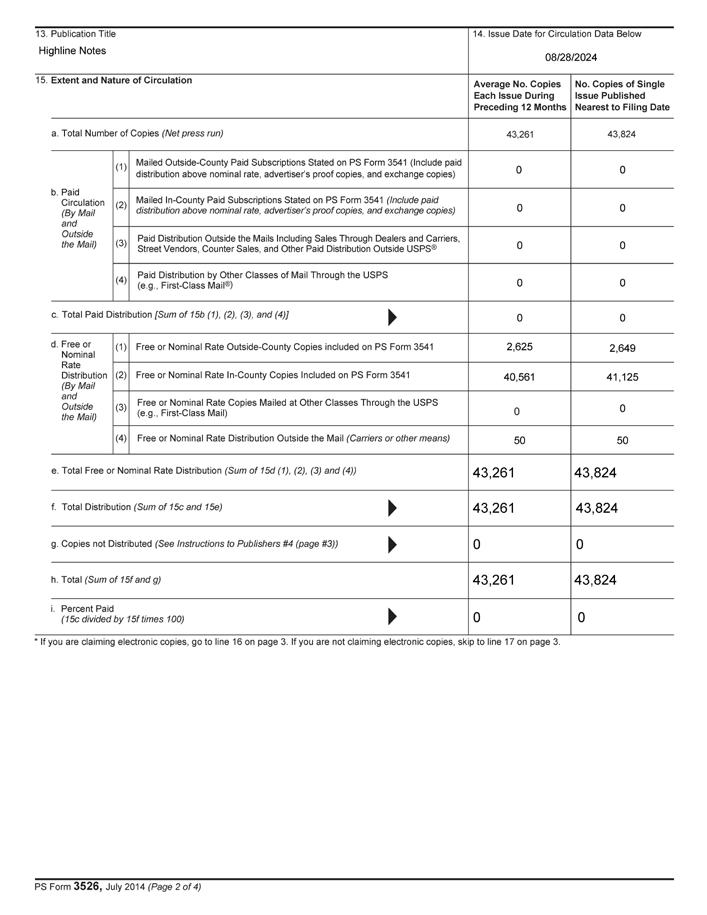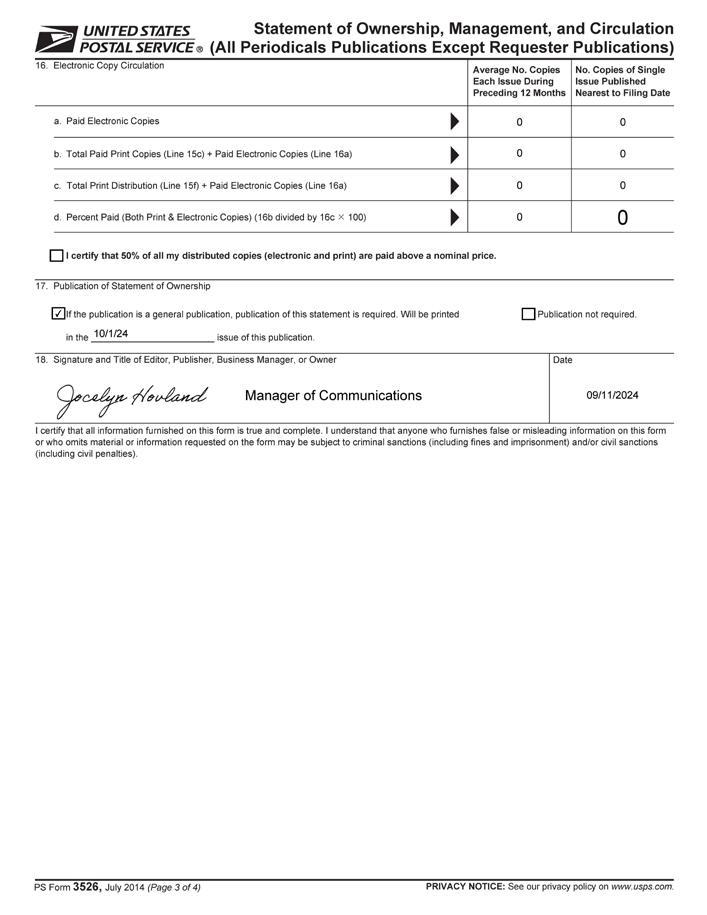HIGHLINE notes
October 2024
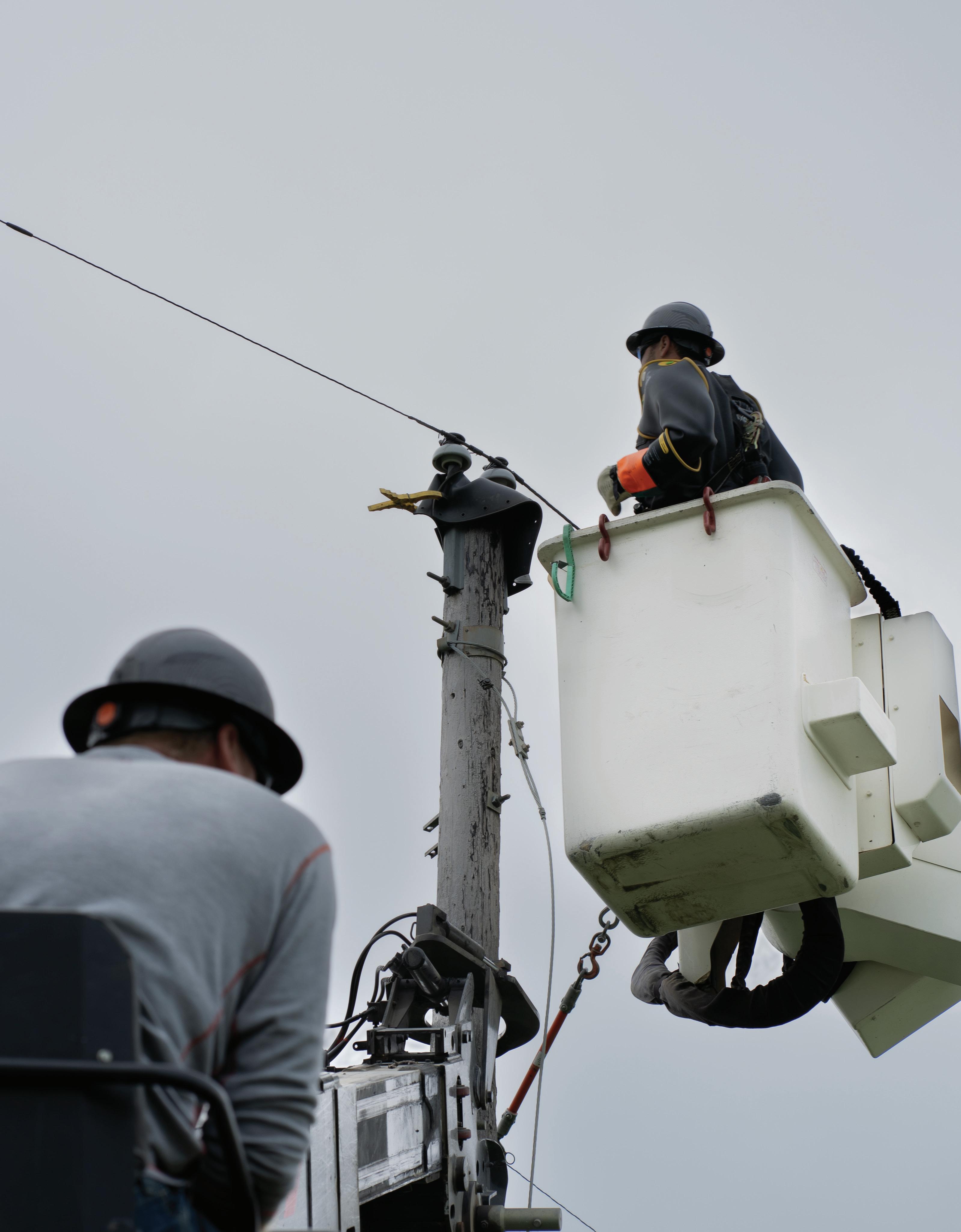
Programs and resources, page 4
Reclaiming the land, page 8


Programs and resources, page 4
Reclaiming the land, page 8
Matthys, president/CEO,

Like many other businesses nationwide, we are examining how artificial intelligence (AI) affects our operations now and in the future.
AI is somewhat of a new buzzword, but it has been around for many years. For example, some residential and commercial heating/cooling thermostats have used AI for over 15 years. A thermostat equipped with AI will learn how you live, meaning what temperature you prefer your house to be during the four seasons or at night versus daytime. It will automatically begin to adjust without your physical interaction.
People of all ages now use AI to help write cover letters, construct emails, answer complicated questions, and more. Various industries also use AI, including
business and finance, health care, education, cybersecurity, entertainment, and utilities. AI is everywhere – you have been using it and may not even know it. It is embedded in computers, software, cellphones, web browsers, and websites. Some people are skeptical of this heightened use of AI tools, while others believe it is the way of the future.
AI tools, like ChatGPT, require enormous amounts of stored data and extensive hardware infrastructure. Large data storage equals significant energy consumption and requires a sizeable cooling load, which is also energy intensive.
So, what does this mean for electric cooperatives, and how are we planning for this potential increase in the future?
CCEC has received inquiries from companies, as have other electric cooperatives, about providing power for large data storage operations. To put this into context, our cooperative currently handles a total peak load of around 270 megawatts (MW). The companies interested in establishing data storage facilities are looking for a capacity of 200 to 1,000 MW.
We are working closely with our wholesale power provider, Minnkota Power Cooperative, to manage new load growth,
the infrastructure required, and future power supply requirements. We also carefully manage and analyze the feasibility of serving larger loads, such as data storage, electric vehicle charging, manufacturing, and residential developments. New load growth has physical and financial challenges, but overall, it is healthy for electric cooperatives because it keeps rates stable and provides for higher reliability.
Will AI become as big as some say, or will it be a trend? I am unsure of this answer, but I assure you that your cooperative is planning for the future and will continue to strive for excellence in reliability, rate stability, and topshelf member service. If AI could improve on any of these things or increase efficiencies, we will utilize it where it makes sense.

The Cass County Electric board of directors met in person on Aug. 27, 2024, and discussed the following topics:
• Moved to approve the August 2024 consent agenda of the regular board meeting consisting of minutes, monthly department reports, director expense report, 2025 director election announcement, and the July purchased power adjustment (PPA).
• Received the chairman’s peport.
• President/CEO Paul Matthys gave the president’s report providing updates from meetings and conferences attended.
• Received a report on the Innovate28 initiative.
• Received a report on the FM Diversion.
• Received a report from USDA’s Rural Utilities Service (RUS)
• Received the July 2024 financial report.
• Moved to approve the August 2024 capital credit estate payments.
• Reviewed upcoming meetings and events.
The next board meeting is Tuesday, Oct. 29, 2024.

Communications:
Morgan Bachelor
Jocelyn Lura Hovland
David Youngs
Printer: Forum Communications Printing
Board of Directors:
Paul White, Secretary
Douglas Anderson
Vanessa Kummer
Stacey Ackerman
Tom Seymour
Glenn Mitzel, Board Chair
Wendy Loucks
Kalvin Hoff, Treasurer
Terry Kraft, Vice Chair
Executive Staff:
Paul Matthys, President/CEO
Jodi Bullinger, VP of Engineering & Operations
Chad Brousseau, VP of Member & Energy Services
Chad Sapa, VP of Corporate Services & CFO
CCEC co-op members, we invite you to start your morning with coffee, pastries, and meaningful conversation with your CEO and director. This is your chance to share your thoughts, ask questions, and connect with the leaders of your electric cooperative in a relaxed setting. Join us for a warm cup and engaging conversation—we look forward to seeing you there!
Alley Beans, Valley City
Wednesday, Oct. 2, 2024, from 9-10 a.m.
Kelly’s Café, Arthur Tuesday, Oct. 8, 2024, from 9-10 a.m.
The Uptown Eatery, Kindred Thursday, Oct. 17, 2024, from 9-10 a.m.
Gordy’s Grill & Fill, Lisbon
Wednesday, Oct. 23, 2024, from 9-10 a.m.
Deaner’s Diner, West Fargo Wednesday, Oct. 30, 2024, from 9-10 a.m.
Tim Sanden, VP of Information Technology & CIO
Highline Notes (USPS 244-740) is published monthly by Cass County Electric Cooperative Inc., 3312 42nd St. S., Suite 200, Fargo, ND 58104. Periodicals postage paid at Fargo, North Dakota 58104, and at additional mailing offices.
Postmaster: Send address changes to Highline Notes 3312 42nd St. S., Suite 200 Fargo, ND 58104

• As the first active community solar project in North Dakota (2016), this program allows members to lease a portion of the solar panels in the array to receive an electric bill credit. This program is an excellent option for renters or people unable to install more permanant solar panels on their roofs.
• This program allows members to decide how much of the electricity they purchase is generated by renewable resources. Participating consumers pay an additional cost to purchase renewable energy and specifically designate how this energy is credited and used.
• This option is for cooperative members interested in owning renewable energy or generation system options for their homes, businesses, or farming operations. These systems are interconnected within CCEC’s system and provide members with power from renewable energy sources.
• CCEC’s online platform allows members to pay their bill, monitor your account, and more! Use your account number to sign up at CassCountyElectric.com. This option saves the co-op and by extion our members money in the long-term.
Autopay
No late fees, no hassle, no problem! When you sign up for Autopay, CCEC will automatically draft your checking account or credit card for the amount of your monthly bill.
• With PrePay, members can pay as they go. Usage is calculated daily and puts you in control of when you pay for electricity. Avoid late payments, enjoy payment flexibility, and monitor your daily usage at CassCountyElectric.com and on the go with the Cass County Electric mobile app.
• A payment drop box is located at our Member Services building in Fargo in the parking lot roundabout. Be sure to include your account number, name, and address, and drop at 4100 32nd Ave S, Fargo, N.D. 58104.
• Call 701-356-4400 to speak with one of our member service specialists and pay your bill via checking account or credit card. To make a payment 24 hours a day with a debit or credit card (Mastercard, Discover, or Visa) or by entering your checking or savings account information, call 701-356-4400 to use our IVR system.
• Mail checks or money orders payable to Cass County Electric Cooperative using the return envelope and remittance included with your monthly bill statement. In Person
• Payments can be made in person at our Member Services building, Monday–Friday, from 7:30 AM to 4:30 PM.

Scholarships and Education
• CCEC contributes $1,000 scholarships to a student at each high school within our service territory. Awarding these scholarships is decided by each school’s Dollars for Scholars chapter. CCEC also provides one $2,000 scholarship through Bismarck State College for students in the electrical lineworker program. Youth Tour
• CCEC sends high school students on a trip to Washington, D.C., to learn about the history of cooperatives, visit with the congressional delegation, and become more knowledgeable about the cooperative business model. Students are selected through an essay contest.
• Paperless billing allows you to receive and pay your energy bill online. Save the environment and money! Levelized Budget Billing
• Levelized Budget Billing is a free program designed to lessen the impact of higher seasonal electric bills. This program uses software that takes a rolling average of your electrical bill from month to month to create a payment that stays relatively consistent each month, regardless of how much energy you use. Cass County Electric Mobile App
• Cass County Electric’s online account platform and 24/7 mobile app puts the analysis of your account at your fingertips. You can pay your bill, view electricity usage, make a payment, view outage status, report an issue, manage account settings, and more. All you need is your account number to sign up today. Business and Commercial
• These accounts have access to dedicated and experienced account reps. As your trusted energy advisor, we offer rate analysis and forecasting, energy and lighting audits, grant and loan assistance, and more. Rural Development
• CCEC has a history of supporting small towns and rural areas in its territory and strives to have a collaborative relationship with all entities involved in projects to utilize their strengths and expertise.
• Our goal is to keep our outage frequency and duration to a minimum while prioritizing the safety of our line crews. If you are experiencing an outage, report it using the Cass County Electric mobile app or by calling 701-356-4400. If we are unable to answer your call, our IVR system uses the phone number you are calling from to report the outage. Our live outage viewer is another tool to check the status of outages and view a summary of the outage information. The outage viewer is available on our mobile app or online at CassCountyElectric.com.
Text Notifications
• We will send you text and email notifications for planned and unplanned outages. This is why it is vital to keep an updated email address and mobile number on file. Update your information in the Cass County Electric mobile app.

• CCEC is involved and sponsors numerous community and member events throughout the year. Local parades, art events, farmers markets, and concerts are just a handful of the events that CCEC supports. You can see a calendar of events at CassCountyElectric.com/events. Member events can also be found in Highline Notes and on our social media pages.
• This discount program is a free benefits program for CCEC members. Co-op Connections provides a variety of discounts for both local and national businesses. Download the Co-op Connections app or visit connections.coop to start saving today!
• The purpose of a cooperative is to realize the economic, cultural, and social needs of its members and community. CCEC has a strong commitment to our communities and a focus on strengthening those in which we exist in and serve. As such, we are active participants in numerous nonprofits, chambers of commerce, and rural and economic development organizations.
• At the beginning of each year, any excess revenues, or margins, from the previous year are allocated to CCEC members and later paid out in the form of capital credits. As a member/owner of a not-for-profit cooperative, this means you benefit from any margins produced by the cooperative. Your account will accumulate capital credits each year you are an active member with us. View the insert to learn more.
• The members of the CCEC board of directors serve as liaisons between fellow members and the co-op executive staff, providing guidance and oversight on co-op operations. There are nine directors on the board, one representing each of the eight districts in our service territory, with District 9 being an at-large position. CCEC members can run for the co-op board, and elections are held at our annual meeting.
• CCEC is an electric cooperative built to deliver reliable and affordable energy. We are owned by our members rather than out-of-town shareholders, which means we are always looking for ways to make a difference in the communities we serve beyond delivering electricity.
• Highline Notes is our monthly magazine that features industry news, safety info, energy-saving tips, and more! All members automatically receive this publication around the first of each month.
Safety and Conservation Blogs
• Safety and education are two core principles upon which electric cooperatives are built. It is crucial for us to keep our members safe and educated on industry topics that may impact their homes and businesses.

Since we strive to help our members save money on their energy bills, members that are enrolled in an online account receive a once-monthly email with energy tips and top stories.
Social Media
• We value our connection to the members we serve. Follow us on Facebook, YouTube, Instagram, LinkedIn, Pinterest, and X to be in the know about the latest energy-saving tips, community outreach efforts, power outages, cooperative news, promotions, and more!
My Co-op Cares
• One of CCEC’s core values is Commitment to Community. We would love to collaborate with your community or nonprofit projects by sending cooperative employees to work on a community project. Visit CassCountyElectric.com/my-co-op-cares for more information.
Donation Program
• CCEC is committed to our members, employees, and communities, and we strive to play an active and meaningful role in said communities. We do this through donations to local organizations in our service territory. To request a donation, visit CassCountyElectric.com/community-outreach.
Operation Round Up
Operation Round Up is a simple, low-cost way CCEC members can give back to the community. Members’ electric bills are rounded up to the nearest dollar, and a volunteer board meets quarterly to distribute the funds. These funds are used within our service territory for charitable, educational, and emergency assistance purposes. Members can opt out or in at any time.
Electric Vehicle Charging Program
• Electric vehicles (EV) represent a growing segment of both the transportation and energy industries. CCEC offers members a specialized rate and a one-time rebate for in-home EV charging. You’ll charge your electric vehicle at home almost every day. Why not pay less every time you plug in?
Electric Heating Program
• When electric demand and market electricity prices are high, an off-peak device in the home automatically switches from an electric heat source to a backup source, such as propane or fuel oil. In exchange, participating members receive discounted off-peak electric rates. Our off-peak program is designed to reduce electric demand during peak times, saving you and the cooperative money.
Electric Water Heating Program
• Next to heating and cooling your home, water heating is the largest user of energy. We offer a reduced rate in exchange for the ability to interrupt large-capacity water heaters.
Rebate Incentives
• Numerous rebates are available from CCEC for heating, water heating, and electric vehicle equipment. Visit CassCountyElectric.com/energy-management to learn more.
• During “peak” hours when lots of people are using electricity, the cost for CCEC to provide power is higher. Participants receive on-peak and off-peak pricing for energy consumed during different hours of the day.

BNI Coal land reclamation processes evolve with changing needs of local farmers, landowners
By Kaylee Cusack /// Photography Michael Hoeft Minnkota Power Cooperative
Jamie Mosbrucker squinted through the humidityheavy air. He took a quick survey of the hundreds of hay bales spotting the quarter section of land under his boots. More would be baled in the days to come, making for an excellent nutritional year for the Mosbrucker cattle.

This land between Center and New Salem, N.D., has been in the family for decades, since before Mosbrucker was born.
“This area is home. It means everything to me,” he said, nodding to the horizon. “I raised my family here. I’d be the third generation, and my son, stacking bales right now, would be the
fourth generation running across these particular two sections.”
The land has looked different at times. A handful of years ago, a tract of it was purchased by BNI Coal and Minnkota Power Cooperative to open a new mining area for lignite coal, used for power generation at the nearby Milton R. Young Station. Once the area was mined and the draglines moved on, the companies began the land reclamation process, which will return the land to its original productivity.
It’s a process BNI Coal has been perfecting since 1979, when land reclamation regulations solidified into what they are to this day. Mining operations like BNI are asked to salvage the top five feet of topsoil and subsoil from any area they mine and replace that soil when mining is complete. Then, BNI works with area producers to restore the land back
to the quality it was before mining – as approved by the North Dakota Public Service Commission – when it can then be released back to local owners.
Mosbrucker is currently working on several areas of reclaimed farmland, producing hay, alfalfa, soybeans and other crops. He’s able to rent the land until it meets the standards for full bond release. It’s a win-win for both the lifelong farmer and BNI Coal.
“I think it’s really neat that I’ve seen the land go from what it was, before there was even mining in this immediate area, to what it is now, and to see the transformation,” Mosbrucker said. “I feel blessed that they allow us to be renting it all these years and work alongside them, because it’s a chunk of my operation.”
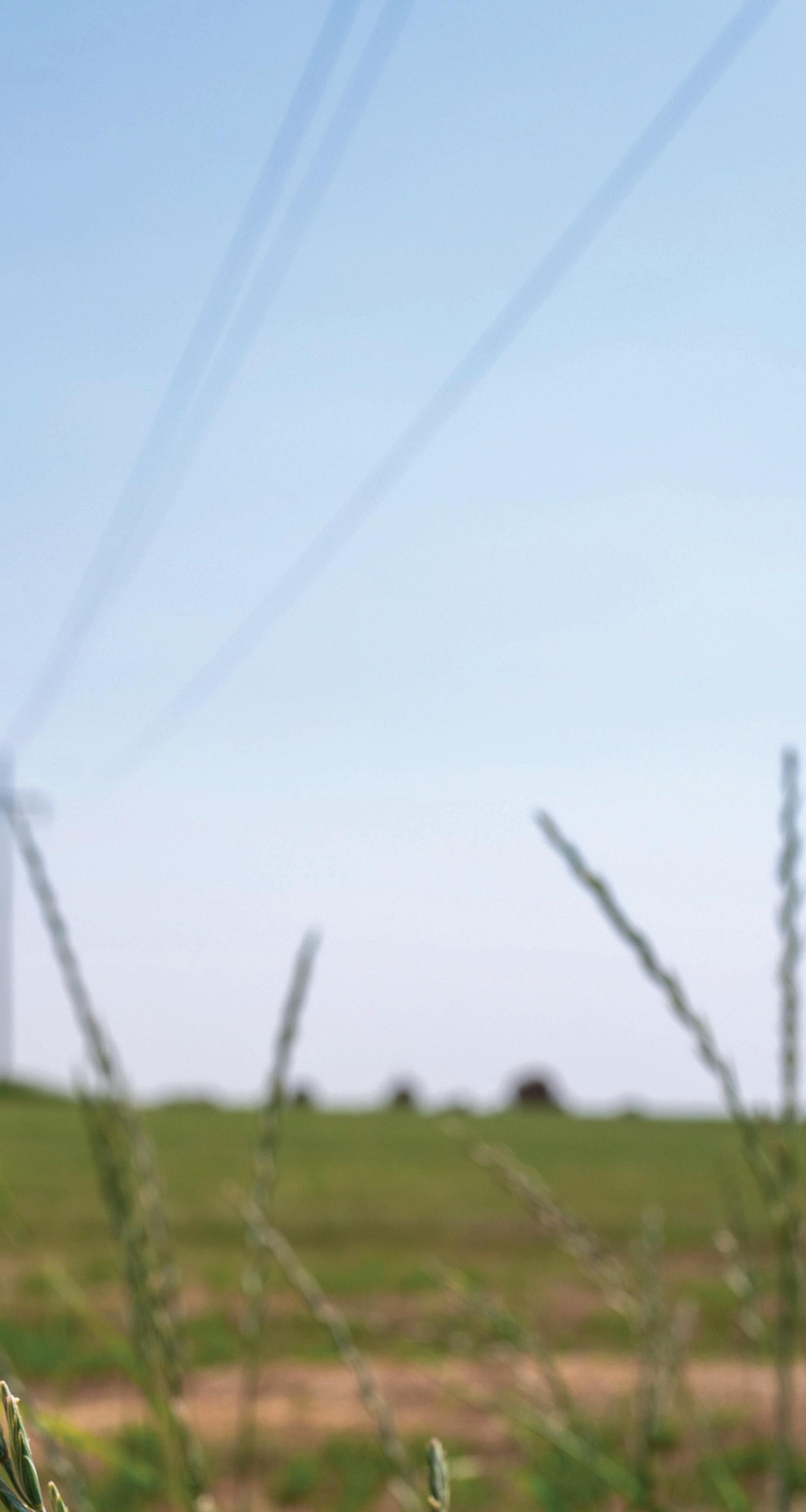

BNI Coal’s Greg Petrick says collaboration with growers like Mosbrucker is critical to reclamation success.
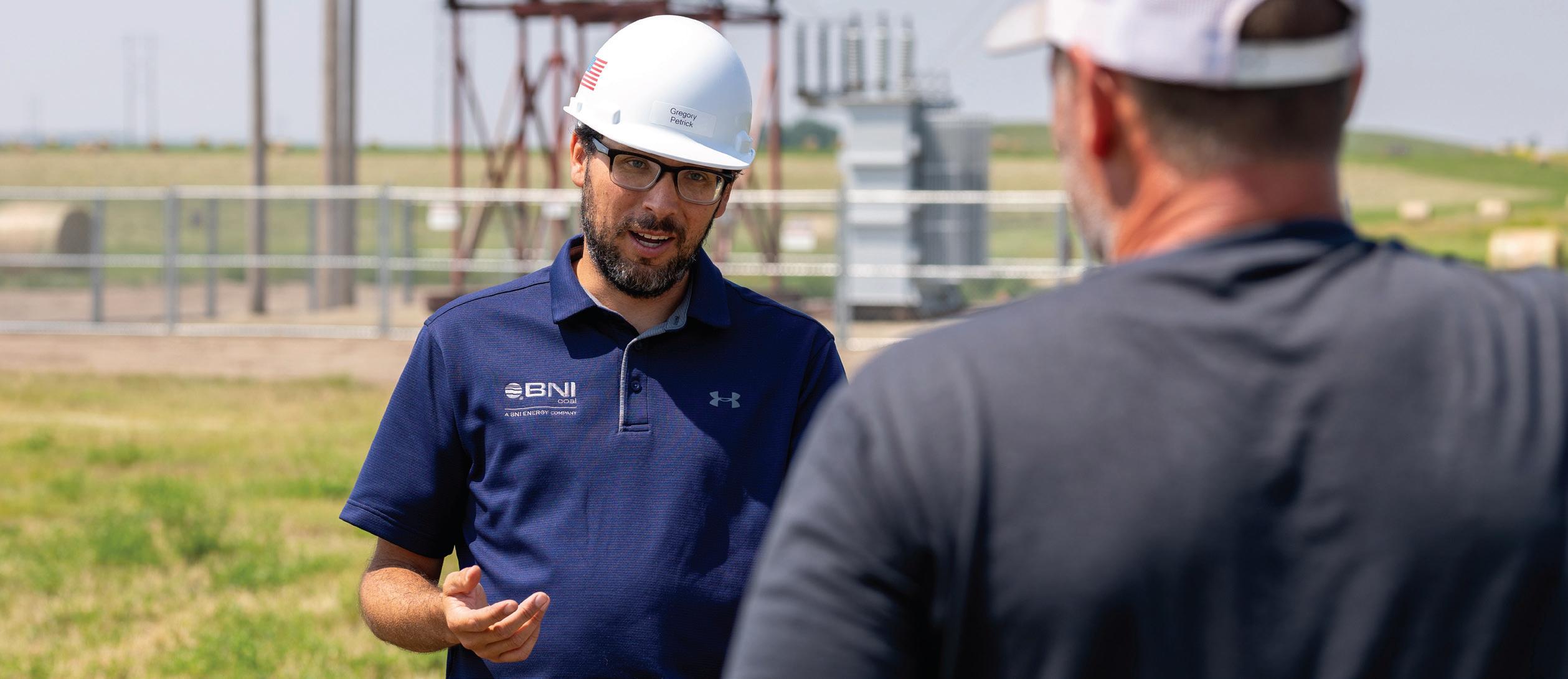
Greg Petrick, Senior Land and Public Affairs Representative for BNI Coal, works with several landowners and producers like Mosbrucker to ensure reclamation meets the standards of mining regulations. He’s focused on making sure all stakeholder voices are heard. Ultimately, it’s the longtime farmers who are the experts on how to make the land the best it can be.
“It’s a collaboration between our producers. Jamie (Mosbrucker) is a great one, because he tells us when something is wrong,” Petrick said. “We need to know what problems exist so we can try to come up with solutions and continue to learn.”
“They’re doing a job putting things back the way their plan says. And sometimes I have a different idea of how it should have been done,” Mosbrucker said with a grin. “But overall, you can’t beat the relationship. It’s been good.”
BNI’s processes have evolved as agriculture changes and the
company learns more about the land. Around 10 years ago, BNI changed its practice of relaying soil with scrapers when it learned the compaction was too high for good growth. It now spreads the soil with a truck and bulldozer, alleviating some of that compaction.
When a challenge arises, Petrick uses his network to find innovative solutions.
“We’re not afraid to try something new. We work really hand in hand – not only with producers, but with academia, too,” he said. “NDSU (North Dakota State University) has been a big supporter of ours, helping grad students so they can come out here and do research projects.”
Reclamation rules cover more than just land used for agriculture, which must be as crop productive as it was before mining. If BNI mines an area that was originally native grassland, it must ensure the same coverage and diversity of native grasses is returned to the

area. With wetlands, the habitat must be ecologically similar to pre-mining conditions. Land is thoroughly analyzed and surveyed before being permitted for mining, including the collection of soil data, vegetation data, wildlife data, water data and more. That data is the measuring stick for land to meet true reclamation.
“There are regulations that we need to do this. But two of our core values at BNI are environmental stewardship of the land and community engagement,” Petrick said, adding that local landowners like Mosbrucker have become critical partners for Minnkota and BNI’s long-term energy goals. “We want to do the best for them to give them back a good return on their land and make it valuable to them again. We couldn’t do it without them.”

Once an area of land is mined, these steps are taken to complete reclamation:
Soil is graded over the mine land to its approximate original contour.
The topsoil and subsoil salvaged at the time of mining is respread.
BNI spends two years preparing the land for seeding, including chiseling, harrowing and rock picking.
BNI works with local growers and other land experts for at least 10 years to environmentally nurture the land to meet its pre-mine productivity.
Once reclamation parameters have been met, the performance bond is removed and BNI releases the land from its permit.

With fall in full swing, hunting season is upon us. With tranquil terrain and a pristine ecosystem, North Dakota’s diverse hunting scene is second to none. Whether it be tracking, hunting, and harvesting tender venison and pheasant meat or the allure of bagging a trophy elk, hunting in the Peace Garden State spawns memories that will last a lifetime.
And while the thoughts of getting lost in nature on a beautiful fall morning in pursuit of prey spurs joy, the perfect hunt cannot happen without safety…and that includes electrical safety.
Simply put, guns, bows, and other hunting gear do not mix with power equipment. While we’re thrilled to call the land around us home, Cass County Electric Cooperative (CCEC) implores all hunters to be mindful, aware, and proactive when it comes to electrical safety.
Never shoot near or toward power lines, power poles, transformers or substations. A stray bullet can not only damage equipment and/ or potentially interrupt electric service but also could be deadly to the shooter. Damage to the conductor could drop the power line to the ground, causing a possibility of electrocution to those nearby.
CCEC urges hunters to follow these safety tips while hunting:
• Familiarize yourself with the location of power lines and equipment on land where you shoot.
• Be careful in wooded areas where power lines may not be as visible.
• Take notice of warning signs and keep clear of electrical equipment.
• Do not place deer stands on utility poles or climb poles. Energized lines and equipment on the poles can conduct electricity to anyone who comes in contact with them.

Scan here for more safety tips!
• Do not place signs or decoys on power lines, poles, or other utility equipment. Anything attached to a pole, except for utility equipment, is an obstruction and poses a serious hazard to utility workers.
“We ask farmers and landowners not to attach posted signs to our power poles. We also want hunters to be mindful of overhead lines and to not shoot birds from power lines or poles. If you come across downed poles or power lines, please call 911 to report the issue,” CCEC President/CEO Paul Matthys said.
In the event that you strike, shoot, or damage any piece of CCEC utility equipment or structures, contact CCEC immediately. The safety of hunters and all members is paramount to CCEC, and we wish all hunters a safe and successful season!
Check out our Pinterest page for more recipes!

Meatloaf
Ingredients:
2 pounds hamburger
1/2 cup ketchup
3/4 teaspoon salt
1/2 teaspoon pepper
1 chopped onion
1/2 cup breadcrumbs
1 1/2 teaspoon Worcestershire sauce
1 egg
Ingredients:
2 pounds ground beef
2 (3 oz.) packages cream cheese
1/4 cup dry onion soup mix
1/2 teaspoon salt
1/2 teaspoon nutmeg
2 cups soft breadcrumbs
1/2 cup milk
2 Tablespoons flour
2 cups milk
Hamburger soup
Ingredients:
1 pound ground beef
1 16 ounce can tomatoes (chopped)
3 medium carrots (sliced)
2 medium potatoes (cubed)
1 medium onion (chopped)
1/2 cup celery (chopped)
3 cups water
3 beef bouillon cubes
1 1/2 teaspoon salt
As the air cools and leaves fall, there’s nothing like a hearty meal made with locally raised beef. These savory recipes are perfect for cozy autumn evenings, nourishing both body and soul while supporting our local ranchers.

Topping:
1 teaspoon molasses
1 teaspoon dry mustard
1 teaspoon brown sugar
3 Tablespoons ketchup
Preparation:
Mix ingredients well and place in a bread pan. Spread on topping. Bake at 350° F for 1 hour and 45 minutes.
Preparation:
Mix meat, cheese, soup mix, salt, nutmeg, breadcrumbs, and ½ cup milk. Shape into balls. Brown lightly in a large skillet. Reduce heat and cook covered, 25 minutes. Remove meatballs; drain fat, leaving ½ cup fat in skillet. Blend flour into fat. Stir in the 2 cups milk. Cook and stir until gravy thickens. Return meatballs to skillet. Cover and cook until heated through.
Note: Mix the flour with a little of the 2 cups of milk before stirring it into the fat. Add the remaining milk.
1/4 teaspoon pepper
1/4 teaspoon dried oregano leaves (crushed)
1 cup frozen green beans
Preparation:
Brown ground beef in a kettle, draining excess fat. Add the remaining ingredients except the green beans. Bring to a boil and reduce heat. Cover and simmer for 15 minutes or until the vegetables are tender. Add the green beans and continue to simmer for 15 minutes more.
Members are helping members. For less than $1 per month, you can make a difference in your community. Participation is simple: Your monthly electric bill is rounded up to the nearest dollar, an estimated average of $6 per year. You can see your current contribution on your electric bill. A volunteer board meets quarterly to distribute the funds used primarily within Cass County Electric Cooperative’s service area for charitable, educational, environmental, and emergency assistance purposes. The funds are never used for political purposes or utility bills.


All ads must be 40 words or fewer and will be abbreviated following our guidelines. No real estate or commercial ads will be accepted. Ads are published for members at no charge as space permits on a first-received, first-printed basis. Ads are due by the 10th of the month prior to publication. Members may submit only one ad per issue. Editor reserves the right to edit or reject any ad. Email ads to: ccec@kwh.com Member market
For sale
Vintage/classic fishing equipment: fly fishing, casting, spinning. Orvis, Abu Garcia/Mitchell, Shimano, Fenwick, Berkley, Bass Pro Shops, Cabela’s, etc. Rods, reels, protective cases, tackle boxes, & equipment. Reasonable offers. 701-799-1963
2003 Harley Davidson Fatboy (100th Anniversary), 13,000 mi. fuel injected, detachable windshield, screaming eagle pipes, lockable saddlebags, chrome swingarm, pics avail., $7,500. 701-361-2551
Variety of expert hand-painted rosemaling. Blue &/or clear quart & 2-qt antique Mason jars, hand-stitched doilies. Various prices on all. Text for pics. 701-977-0822
Early ‘70s toys, Tonkas, IH 1466/404 w/ implements, Case 930 w/ implements, pics avail. 701-306-1777
2020 Forest River Rockwood Freedom 1940 LTD pop-up camper w/ Westinghouse 2550 generator, $6,500. 402-212-7034
Bolt action rifle, 204 Ruger Howa model 1500 w/ Leupold VX-III 4.5-14x40 scope, like new, $800. 701-238-8119
1978 Lincoln Town Car 460 engine opera windows. 1982 Eldorado Cadillac. 701-840-0694
1940 Allis Chalmers WC tractor, narrow front, restored w/ new paint & decals, motor overhaul, new radiator, tires, clutch, & gauges, throw out bearings, runs & drives great. Allis Chalmers pull type 2 bottom plow, good lays, moldboards, 1 cutting coulter, works as it should, $3,500/both. 701-640-7092
Splendide automatic clothes washer/ dryer (WD2100XC) for camper or lake home, exc. cond., used little, $750. 701-
412-8113
1991 GMC ½ ton 2x4 Sonoma 350 eng. $1,000/OBO. 79 Northwood Alum. 13.7’ w/ trailer 6hp. Evenrud & Minnkota trolling motor, $600/OBO. 701-680-7378
Barn cats. 701-840-0295 or 612-8652995
Old comic books & vintage soap box derby wheels, pics. avail. 701-200-3976
2013 John Deere 2032R tractor w/ H130 loader, hydro, MFWD, 773 hrs. 32hp. heated cab, 3pt, rear & mid PTO, $20,500. 54” JD front mount snowblower, $3,500. 701-799-1493
Wanted
John Deere 280 LX lawn tractor, w/ or w/o mower deck, must be in running cond. 701-372-3860 / moparnut@rrt.net

